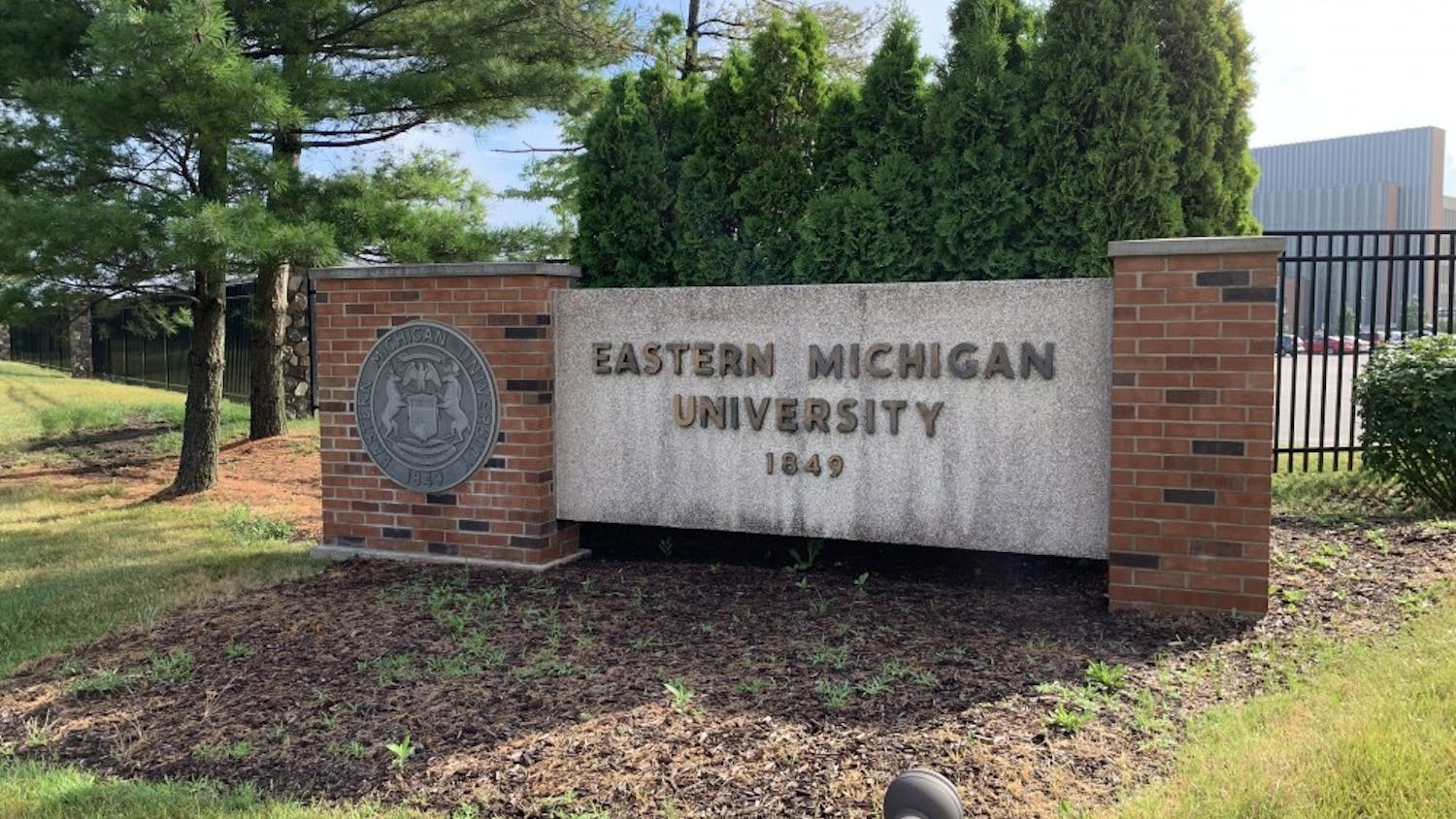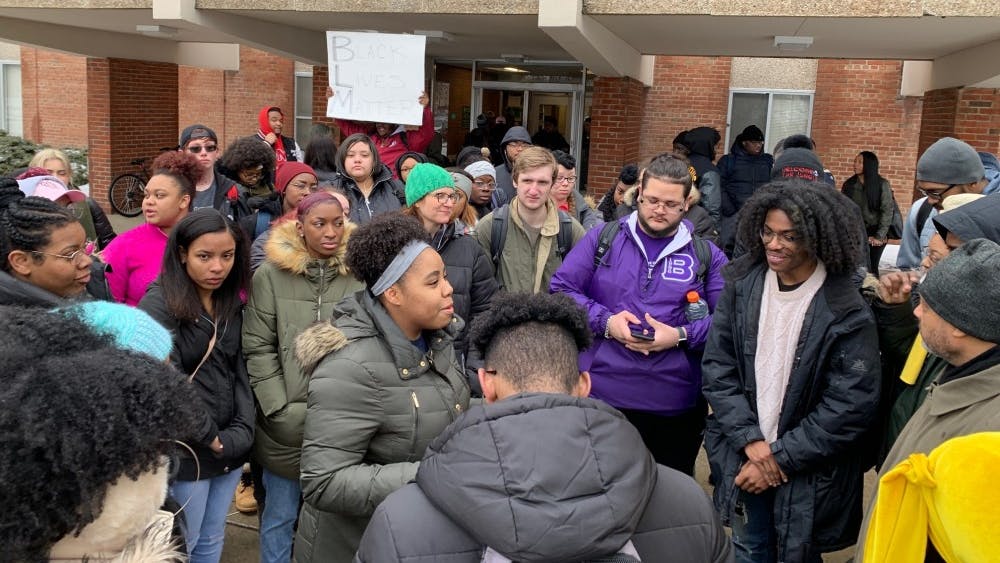Members of the Eastern Michigan University Federation of Teachers (EMUFT) gathered at Welch Hall on April 21 to protest unfair wages, job insecurity, and lack of opportunities in decision-making processes.
According to EMUFT, more than 50% of EMU’s instructional staff are non-tenured, lecturers have little to no opportunity for promotion or career advancement, and their salaries are low.
“I think they've gotten exasperated because of the inflation and the pandemic, and the lack of full-time employment or meaningful full-time employment within academia, not just at EMU,” Anke Wolbert, vice president of EMUFT and part-time lecturer at EMU since 2011, said.
Many of the issues being protested have personally and professionally impacted EMU’s part-time and full-time lecturers.
“There is little opportunity to participate in wider decision-making processes; that is frustrating,” Jeremy Proulx, an EMU full-time lecturer and grievance officer at EMUFT, said. “There’s also little opportunity for advancement, so my position remains stagnant. Once you factor in inflation, I’m making about the same I was in 2011.”
Daric Thorne, a part-time lecturer and president of the EMUFT, said lecturers make up a significant portion of EMU’s faculty, but still don’t receive benefits such as healthcare.
“When I learned that the composition of our unit is two-thirds part-time lecturers, who work more or less full-time here at EMU, yet have never been made full-time lecturers or they are full-time lecturers across three different institutions, it is something I considered outrageous,” Daric Thorne, part-time lecturer and president of the EMUFT, said. “They don't have access to healthcare at the university... And that means that when we get sick, we have to determine whether or not we're going to come into work, and we only get three sick days a semester.”
EMUFT has communicated with the university’s administration regularly regarding these issues due to contract negotiations that occur every few years.
“Lecturers don't make a tremendous amount of money, yet lecturers have one of the highest workloads in Michigan with the lowest salaries,” Wolbert said. “Many of them work multiple jobs so that they can pay their bills. The past couple of years has been financially challenging because the state budget has dropped because of the pandemic, and there’s generally low enrollment within universities in Michigan... It also doesn't justify that we have part-time lecturers who have been a part of the institution for 10, 15, or 20 years without any access to healthcare, retirement, or full-time employment. It’s not sustainable. The administration is aware of that, and we have contractual conversations with the administration, but we have not come up with acceptable solutions.”
Responses made by the university have not been satisfactory, according to Wolbert.
“Both part-time and full-time lecturers took a zero compensation increase year, which means we got no pay increase in 2020 and 2021,” Wolbert said. “We did that because of the financial situation of the university, and it seemed like the right thing to do. However, for the part-time lecturers, the pay increase the following year was 1% which equates to $39 per class that I make more this year than I did last year, and that is pre-taxes.”
EMUFT aims to spread awareness for these concerns and strengthen relationships with the administration. Wolbert hopes that this rally draws the attention of the Board of Regents and the administration to create “a more meaningful and sustainable conversation.”
“They don't know there is a difference in rank and financial insecurity, and many lecturers are just as poor as our students,” Wolbert said. “Many of us are doing the same kind of summer job as our students because we don't have teaching in the summer ... We hope that by publicizing this more, it will be harder for them to hide behind the silence that's usually around the subject matter.”
Contraction negotiations for lecturers will begin next year, but Thorne wants EMU to know EMUFT is “serious” about having these conversations with the university.
“We're giving the regents and the administration a heads up that we're here,” Thorne said. “We are prepared to begin having these conversations. We gave them a packet with a lot of information and a lot of data to sort through that we think will help them understand our position. And of course, we invite them to have a conversation with us today and in the future.”
The rally’s purpose was to make the public aware of the lecturers’ requests to change university policy and make it more sustainable for part- and full-time faculty.
“We hope that the university will listen and take our requests and concerns seriously,” Proulx said. “The only way the university has really started listening to us is by making a sort of public stink about things. That's the goal right now to make this a little bit public to raise some awareness in the larger community and among the Board of Regents so that finally, the people in the university who make decisions can sit down in a room with us and give us a voice in how you shape policy at the university.”
Melissa Thrasher, director of media relations, said EMU supports lecturers and respects their work at the university.
“We are pleased to work with our lecturers to discuss their concerns,” Thrasher said in a written statement. “We have great respect and appreciation for their work and role at the University.”
These issues aren’t just prevalent in higher education but throughout all levels of education as well. A survey conducted by the National Education Association (NEA) indicated a labor shortage and burnout in education.
The Bureau of Labor Statistics also reports that there are approximately 567,000 fewer educators in America now than pre-pandemic.
“For all they do for our communities, educators need and deserve our collective respect,“ Becky Pringle, NEA President, said.


















